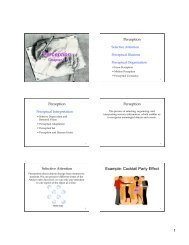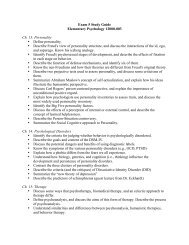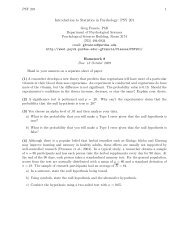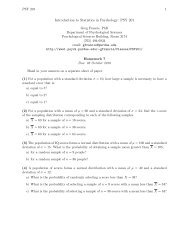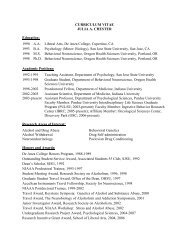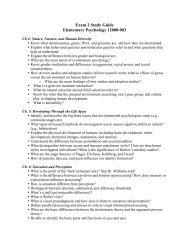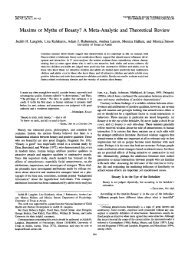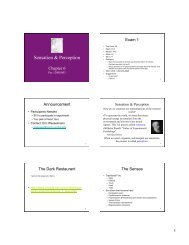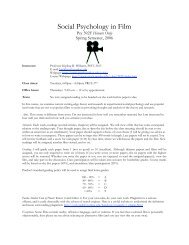Introduction to Cognitive Psychology - Department of Psychological ...
Introduction to Cognitive Psychology - Department of Psychological ...
Introduction to Cognitive Psychology - Department of Psychological ...
Create successful ePaper yourself
Turn your PDF publications into a flip-book with our unique Google optimized e-Paper software.
Greg Francis 1/6/11Learning phrases!! You do not have <strong>to</strong> relearn the role <strong>of</strong> the word“boy” for each useThe boy eats candy.Long term dependencies!! Phrase trees have no problems with long-termdependencies and recursion!! The rewrite rules provide the structure needed<strong>to</strong> insure the right if-then combinationI like the happy boy.I gave the new boy a cookie.The happy boy’s cat eats candy.S--> either S or SS--> if S then SS -- sentenceeither -- the word “either”or -- the word “or”if -- the word “if”then -- the word “then”Purdue UniversityPurdue UniversityPhrase tree!! A phrase tree can handle this type <strong>of</strong> sentenceSifSSthenS or Sthe boy eats hot dogseitherthe girl eats candythe girl eats ice creamPurdue UniversitySignificance!! Rules and phrase trees allow us <strong>to</strong> identifyfundamental characteristics about howhumans communicate!! Consider all the ways you mightcommunicate!!Morse code, 0-1’s, English, Spanish, tapping<strong>to</strong>es, beeps,..!!an infinite number <strong>of</strong> ways <strong>to</strong> create a languagePurdue UniversityLanguage similarity!! All human languages are very similar,compared <strong>to</strong> the possibilities!! In some sort <strong>of</strong> language space all our 6000languages are clustered <strong>to</strong>getherHumanMartianDolphinAlphacentaurianPurdue UniversityLanguage universals!! There are several types <strong>of</strong> universals!! For example, in English the normal pattern <strong>of</strong>sentences is!! Subject-Verb-Object!! (There are exceptions: “A bear he shot.”)!! This pattern is true for most <strong>of</strong> the world’slanguages!! 98% <strong>of</strong> languages have the Subject before the Object (theVerb location varies across languages)!! 80% <strong>of</strong> languages have the Subject before the Verb (theObject location varies across languages)Purdue UniversityPSY200 <strong>Cognitive</strong> <strong>Psychology</strong> 5





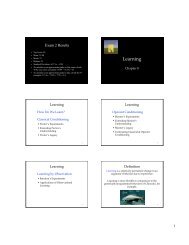
![Exam 4 Study Guide[1]](https://img.yumpu.com/45196739/1/190x245/exam-4-study-guide1.jpg?quality=85)
